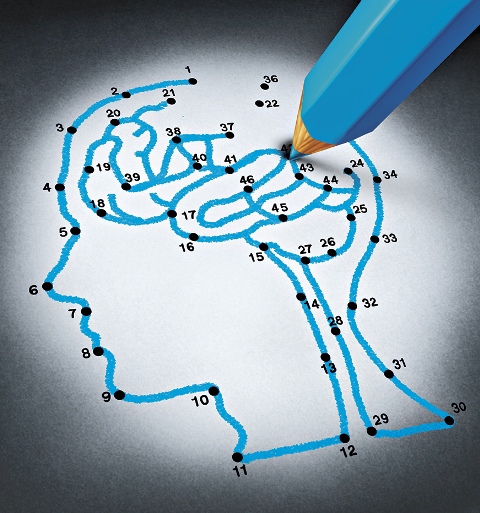By Yves Joanette & Flamine Alary
Over the last decade, many countries, including Canada, have felt the rising tide of dementia. The numbers of Canadians that live with dementia will more than double by 2050, whereas it will more than triple elsewhere in the world (World Alzheimer Report 2015, The Global Impact of Dementia: An analysis of prevalence, incidence, cost and trends. Alzheimer’s Disease International). Such an increase is essentially due to the aging of the population since the main risk factor for most of the brain disease causing dementia — such as Alzheimer’s disease — is age, and this risk increases significantly for the oldest. Given that increase in numbers of older individuals is particularly important for the oldest among the older, the conditions for a dramatic increase in the number of cases of dementia are with us for the coming years, here and globally. And each time one person is diagnosed with dementia, there is at least another person whose health and wellness can be affected, namely that person’s caregiver(s). Consequently, for the human cost associated with dementia, as well as for the paramount health costs expected — more than a trillion dollar world-wide in 2018 (World Alzheimer Report 2015, The Global Impact of Dementia: An analysis of prevalence, incidence, cost and trends. Alzheimer’s Disease International)— dementia represents an important public health challenge that is now recognized as such by the World’s Health Organization.
The magnitude of the challenge requires a major response from the research community in order to understand the causes of dementia, its treatment and risk reduction strategies, as well as to ensure the best quality of life for those currently living with dementia as well as their caregivers. The Canadian Institutes of Health Research’s (CIHR) Dementia Research Strategy was introduced to foster this effort in Canada. But the rising tide is not limited to Canada. The creation by the World Health Organization (WHO) of a Global Dementia Observatory (GDO), the constitution of a WHO-led working group to prioritize the required research to face the global challenge of dementia (Shah, H., Albanese, E., Duggan, C., Rudan, I., Langa, K. M., Carrillo, M. C., … Dua, T. (2016). Research priorities to reduce the global burden of dementia by 2025. The Lancet Neurology, 15(12), 1285–1294), as well as the initiation of work towards the development of a WHO Global Action Plan, all constitute concrete examples of the world working together to tackle the challenge of dementia. In acting in a coordinated and determined way, Canada will not only enhance health and wellness in our Canadian aging population, but we will contribute to creating another source of pride for a country that is looked upon as a small but bold leader in the world of public health.
As a matter of fact, the Canadian community-based approach to dementia has been the object of a very interesting chapter in one of the latest Alzheimer’s Diseases Annual Report World Alzheimer Report 2016, Improving healthcare for people living with dementia: Coverage, quality and costs now and in the future). The report underlines the involvement of community-based family practitioners in the diagnosis and management of individuals living with dementia, frequently living also with other chronic diseases. This of course underlines the challenge of the training of all health professionals in the community, including general practitioners. This topic, as well as the training of personal workers in support to individuals with dementia at home or in long-term care facilities represents a major challenge. For that reason, the CIHR Institute of Aging is considering to eventually support educational research on this question in order to better prepare all health professionals to face the challenge of the aging population and of the surge of health conditions such as dementia.
We also need to ensure that the care for individuals living with dementia, and their carers, are the best possible. Recently launched by the World Dementia Council (WDC), there is now a global care statement that can be taken as a reference to achieve this goal. As underlined by the WDC Chair (YJ): “Improving dementia care and support remains a top priority for care providers and those affected by the disease, especially while no cure or disease-modifying therapy is available. That is why WDC’s Global Care Statement is so important in specifying what needs to be done to offer person-centered, high-quality care and support to everyone affected by what is undoubtedly the biggest health and care challenge facing the world today.”
The WDC Global Care Statement includes eight important Principles of High-Quality Care and Support, including for individuals to receive a timely and accurate dementia diagnosis; for people living with dementia to be treated with dignity and respect; for communities to be inclusive of people living with dementia and encourage their engagement in the community; for dementia care to be person- and relationship-centered and based upon continuous assessment and individualised planning; and for people living with dementia and their care partners to be active participants in care planning and decision making.
The challenge of dementia is, and will, create immense challenges for all health professionals, as well as for long-term care facilities. Apart from providing the necessary knowledge and training to all health professionals and workers, there will obviously be a need to work across disciplines to ensure an holistic approach to disease management; and for care coordination and collaboration to occur between all care providers, including in monitoring and evaluating the care and support provided. Only under such conditions, will we be able not only to face the challenge of dementia, but to ensure wellness in the trajectory of those living with dementia and their caregivers.
Yves Joanette is Scientific Director, CIHR Institute of Aging, Lead CIHR Dementia Research Strategy Chair, World Dementia Council. Flamine Alary is Project Manager, CIHR Institute of Aging.

